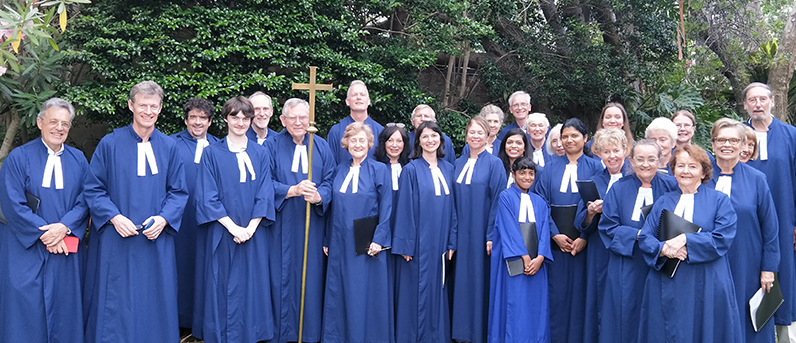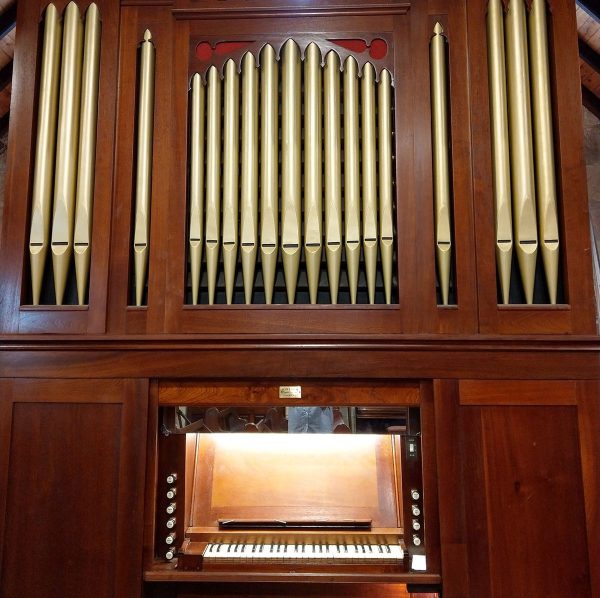Music is an important part of the life of our Parish, and plays a significant role within our worship life, as well as those times when we gather for social events and functions.
We are blessed with some fine instruments and gifted musicians, ably led by a Director of Music and Assistant Director of Music.

All Saints’ Choir
All Saints’ Choir is an active part of the worship at the 10:00am Sunday Service. The choir sings most Sundays from February to December, with a mid-year break. The choir occasionally sings for weddings, funerals and for other special services and social events when requested. The repertoire usually includes singing a setting of the Eucharist, four hymns, psalmody, a motet during communion and anthems. Occassionally the choir sings contemporary songs that have been arranged for a choral setting.
There is a “choir room” with a large library of music.
Rehearsals are held every Thursday evening from 7.30pm.
All are welcome to join the choir.

Choral Scholarships for All Saints’ Choir
All Saints’ Church Choir in the Anglican Parish of Hunters Hill offers scholarships for members of our choir.
Scholarships are made possible through past gifts and benefactors of choral music.
Scholarships usually consist of a financial contribution towards the scholars education, such as HECS or Tuition Fees.
High School Scholarship
For a High School aged student we offer a scholarship of up to $4,000.00 for the year.
Tertiary Scholarship
For a more “mature” scholar, studying or otherwise, we offer a scholarship of up to $6,000.00 for the year.
Members of our choir who wish to take up this opportunity are recommended to the Rector by the Director of Music. If you need more information please contact Aleks Mitsios, Director of Music.

Bevington & Sons Pipe Organ
This organ by Bevington & Sons of Soho, London, was ordered in 1887 and installed in All Saints’ Church in just twelve days by Charles Jackson the following year although the tuning contract seems to have been given to Charles Richardson shortly after. It was heard in public performance for the first time on Saturday June 16 of that year when a special choir of fifty voices performed Mendelssohn’s Elijah. This is the only one of two organs by that firm known to have been brought to New South Wales that still survives. The other, built in 1841 for the first St Mary’s Cathedral was destroyed by fire with that building in 1865.
The Bevington Organ includes:
- 3 manuals (plus pedalboard)
- 25 stops
- 1460 pipes
- 5 combination pedals
- 2 horseshoe pedals for couplers
- lever swell pedal
The organ had a restoration in 1998, but remains essentially original, with the only real change over the centuries being the way the bellows have been inflated – firstly by some poor boys who pumped manual bellows, followed by a steam pump that drew water from the spring at the front of the property (with the divot still visible in our lawn today), followed by an oil-based pump, and finally electricity. Remains of the old pumps are still under the floor.

Kinloch Pipe Organ
This organ was originally built c.1845 for St. Andrew’s Scots Church which was located behind St. Andrew’s Cathedral where the present day St. Andrew’s House now stands. The organ was removed in 1885 when a larger organ was erected and was rebuilt in Roseby Memorial Congregational Church at Marrickville. It remained in this church until about 1970 when it was bought by the Sydney organ builders Pitchford and Garside, restored and then placed in St. Paul’s Anglican Church, Rose Bay.
In 1992, upon the closure of St. Paul’s Anglican Church, Rose Bay, the parish decided to donate their organ to St. Andrew’s Cathedral School who placed the organ in the Cathedral. An organ loft was built above the Sound Booth, adjacent to the main organ console, and the organ was opened with a recital being given by the Headmaster, Mr Allan Beavis on 26th March, 1992. The organ was used extensively for boys only Evensongs and for any choral works needing only light accompaniment. It was also used for early English repertoire in recitals. It served the cathedral well right up until the building was closed for restoration in 1999 when it was purchased by our parish and placed in St Mark’s Church.
John Kinloch, with partner William Johnson built the first organs to be constructed in the colonies. This organ is the only remaining organ to be known to have been built by Kinloch on his own.